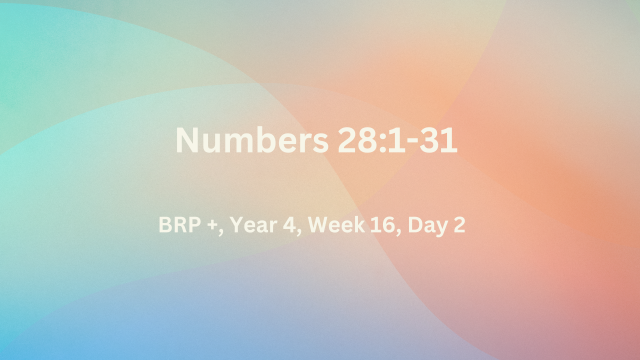Numbers 28:1-31
Q.1. Why did God require daily sacrifices and offerings? What message did this send to His people? – (Num.28:1-8)
Every day, morning and night, a one-year-old perfect male lamb was sacrificed along with a grain, oil, and drink offering. The sins of the Israelites were thus covered. Their obedience, as an expression of their trust in God, was a soothing aroma to the Lord (Num.28:1-8). The sacrifices to the Lord foreshadowed the perfect sacrifice of Jesus – two male lambs one year old without defect as a continual burnt offering every day (Num.28:3 c.f. 1 Pet.1:19). The writer to Hebrews contrasted the need for constant sacrifices, with the once for all sacrifice by the Lamb of God Who takes away the sins of the world (c.f. Heb.9:6-10; 13:15).
Q.2. What did the weekly and monthly sacrifices and offerings teach the people about the holy God in their midst? – (Num.28:9-15)
Each Sabbath, and the marking of each new month required additional sacrifices and offerings. These reinforced the message that – without the shedding of blood there is no forgiveness (c.f. Heb.9:22). Each month they were to present – a burnt offering to the Lord involving two bulls and one ram, and seven male lambs one year old without defect (Num.28:11). These sacrifices reminded them that the God Who dwelt among them was a holy God. It meant that Israel knew the days of the year, so they could consistently observe the special convocations.
Q.3. What did the annual Passover signify for Israel? What was the Feast of Unleavened Bread meant to convey? – (Num.28:16-25)
Each of the seven Festivals was commemorated for a specific purpose. They were times when no work was to be done, so that God’s people could focus on Him, and enjoy family times together. The Passover was the starting point of Israel’s festivals each year (Num.28:16). It marked the birth of the nation and was a symbolic meal to explain Israel’s history – 26 And when your children say to you, What does this rite mean to you?’ 27 you shall say,It is a Passover sacrifice to the Lord who passed over the houses of the sons of Israel in Egypt when He smote the Egyptians but spared our homes’ (c.f. Ex.12:26-27). The connected Feast of Unleavened Bread also demanded more animal sacrifices. It reminded Israel of the circumstances of their beginning –They baked the dough which they had brought out of Egypt into cakes of unleavened bread. For it had not become leavened, since they were driven out of Egypt and could not delay, nor had they prepared any provisions for themselves (c.f. Ex.12:39 c.f. Num.28:17-25). To commemorate the exodus from Egypt, they were to carefully sweep their homes of any leaven or yeast, signifying the spread of sin (c.f. Mk.8:15; 1 Cor.5:7-8). God planned that there would be a serious annual spring cleaning for every home.
Q.4. Why was the Feast of Firstfruits established for the tribes of Israel? – (Num.28:26-31)
The Feast of Firstfruits and Feast of Weeks here described, covered two festivals with a gap of seven weeks in between (Num.28:26 c.f. Lev.23:9-21). Israel enjoyed three harvests each year. (i) the early barley harvest; (ii) the wheat harvest that followed; (iii) the grape and olive harvest at the end of the season. The Feast of Firstfruits took place the day after the Passover Sabbath when the Israelites were to make a faith offering by waving a sheaf before the Lord in anticipation of a harvest (c.f. Lev.23:10-11). Paul applied this to Christ’s resurrection that followed His death as the Passover Lamb. His resurrection foreshadowed the resurrection of countless saints (c.f. 1 Cor.15:20-23). The Feast of the Ingathering of the Wheat Harvest (also known as the Feast of Weeks) took place seven weeks after the Firstfruits sheaves were waved before the Lord. Seven weeks later, on the fiftieth day (or Pentecost), Israel was to wave two loaves of the harvest that God provided. God chose and planned to baptize the Church with His Holy Spirit on the Day of Pentecost when there was an ingathering of three thousand converts (Acts 1:5 c.f. 2:1 & 41). All these offerings involved the offering of blood sacrifices (Num.28:27-31).

